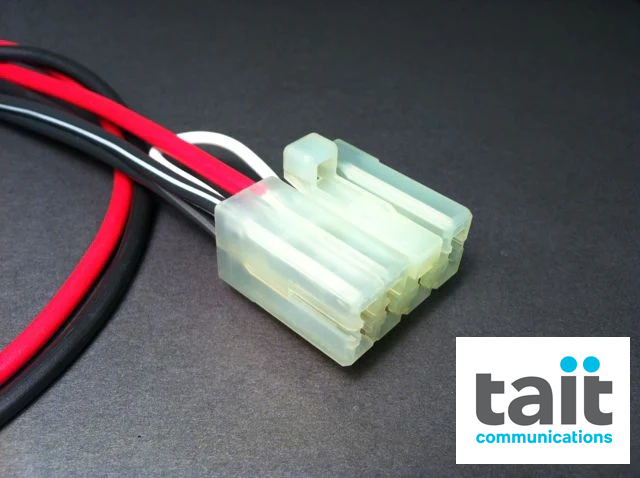
If you need to create some new power-looms for your Tait 2000 Series radios, finding Tait documentation for replacements is difficult. See below the connector and pin details.
Thanks to VK6YSF (Peter) for his content helping me learn to programme and work with these radios!
Model Codes and Identification

See a full-break down listed below
Power and Pin Out
The connector and pins are TE Connectivity, please see part numbers listed below.

Audio Output
If the radio has an internal speaker (EG: 2000 II has no speaker) it requires the loop wire for the audio output.
If you have the wire loop and external speaker, audio will come out of both.
If the radio has an internal speaker (EG: 2000 II has no speaker) it requires the loop wire for the audio output.
If you have the wire loop and external speaker, audio will come out of both.
| Item | Part-Number | Notes |
| Connector / Housing | TE Connectivity 172025-1 | |
| Pin | TE Connectivity 712-2113 |
Wiring Diagram

Programming Cable
Programming Port: Microphone Port
Available online are Tait 2000 Programming Cables for purchase, however you can make your own Programming Cable terminating into a Serial DB9 connector if required.

Model Codes and Identification Table
| Features 10 Conventional 4 channel 15 Conventional 24 channel 16 Conventional 17 Conventional 80 channel 18 Conventional 100 channel 20 Conventional 100 channel 20 Conventional 1200 channel (if FG = 34) 21 Conventional 30 Trunked 6 call preset, 1023 trunked, 4 conventional 32 6 preset, 1023 trunked, 4 conventional, no control 33 Trunked 2 digit dial, 1023 trunked, 4 conventional 35 Trunked 3 digit dial, 20 call preset 40 Trunked direct call dial 50 Dual Mode, trunked and conventional (100 channel) 60 LTR Mobile, conventional 66 LTR Mobile, 10 systems x 10 groups, conventional |  |
| Frequency Range 1 220-270 MHz 2 66-88 MHz 3 136-174 MHz 4 175-235 MHz 5 400-470 MHz 6 450-520 MHz 7 330-366 MHz 8 800 MHz (TX: 806-870 MHz, RX: 851-870 MHz) 9 360-400 MHz 0 500-530 MHz F 300 MHz (TX: 300-336 MHz, RX: 330-360 MHz) K 900 MHz (TX: 896-941 MHz, RX: 935-941 MHz) W 300-338 MHz |  |
| Deviation and Channel Spacing 1 Wide band 5 kHz, 25 kHz channel spacing 2 Narrow band 2.5 kHz, 12.5 kHz channel spacing 3 Mid band 4 kHz, 20 kHz channel spacing 4 Dual wide/narrow band (programmable) |  |
| Frequency Stability 1 5 ppm (-10 – 60°C) 2 2 ppm, later 1.5 ppm (-30 – 60°C) 3 3 ppm (-30 – 60°C) 4 ? 5 2.5 ppm, later 1.5 ppm (-30 – 60°C) 6 2 ppm, used in 6.25 kHz offset products (-30 – 60°C) 7 1.5 ppm (-30 – 60°C) |  |
| Country/Customer A Standard B Australia C Standard D Germany E France F UK G M/A-Com H China I Australia J USA/Canada K Unimo L South America M Electcoms N Taiwan P USA/Canada R South America T USA/Canada U Unbatched product Y Argentina Z France (Alcatel) |  |
| Factory Fitted Options Please refer to the detailed list [3]. |